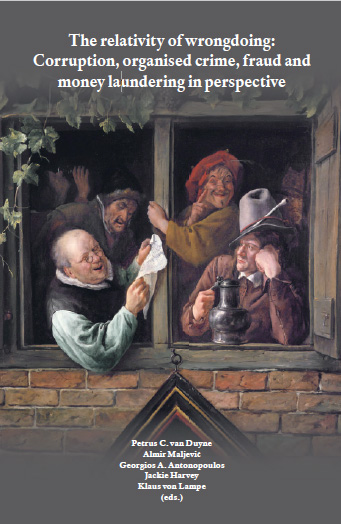
Petrus C. van Duyne, Almir Maljevic, Georgios A. Antonopoulos, Jackie Harvey, Klaus von Lampe (eds.)
The Relativity of Wrongdoing: Corruption, Organised Crime, Fraud and Money Laundering in Perspective
Nijmegen: Wolf Legal Publishers, 2015
367 p.
ISBN 978-94-6240-228-7
Abstract:
This edited volume contains selected peer-reviewed papers presented at the 15th Cross-border Crime Colloquium, held at the Criminal Policy Research Centre, Sarajevo, Bosnia and Herzegovina, in May 2014. Petrus van Duyne provides an introduction. Anna Markovska and Alexey Serduyk examine corruption and state capture in the Ukraine. Anna Sergi presents a case study of the relationship between 'ndrangheta and local politics in Reggio di Calabria. Joschka Proksik analyzes the nature and consequences of differential perceptions of organized crime held by local and international actors in Kosovo. Colin King provides an overview of the legal response to organised crime in Ireland and critizes a move away from due process towards crime control. Petrus van Duyne and Benny van der Vorm investigate the origins and application of the Dutch Bibop Act (Act Furthering Integrity of Decisions by Public Administration). Tom Vander Beken and Jelle Janssens trace the origins and development of organized crime assessments in Belgium. Srdan Vujovic explores cigarette smuggling in Bileca, Bosnia and Herzegovina. Klaus von Lampe, Marin Kurti, and Jacqueline Johnson examine the link between poverty and crime based on focus group interviews with consumers of illegal cigarettes in New York City. Alexandra Hall and Georgios Antonopoulos explore the tactics and methods of the illegal marketing of pharmaceuticals over the internet. Anita Lavorgna and Anna Di Ronco discuss the strengths and weaknesses of codes of ethics in Italian professional football. Jackie Harvey and Simon Ashton examine the role of the Financial Services Authority (FSA) and of the Serious Organised Crime Agency (SOCA) in Anti-Money-Laundering (AML). Sabina Zgaga shows how Slovenian legislation on insolvency crimes is implemented in national legal practice, drawing on police and prosecutorial statistics. Suncana Roksandic Vidlicka and Aleksandar Marsavelski discuss criminal responsibility of political parties for economic crime against the backdrop of the CDU corruption scandal in Croatia, and Brendan Quirke examines the performance of the European anti-fraud agency OLAF.
Download the cover, table of content and introduction of this volume here.